Testimonials
Read testimonials from students and graduates from the Master of Science programme (MSc) in Forest and Nature Management:
Astrid Harbo holds an MSc in Forest and Nature Management. A desire to work with development and sustainability in developing countries took her to South Sudan, where she currently works for the UN World Food Programme.
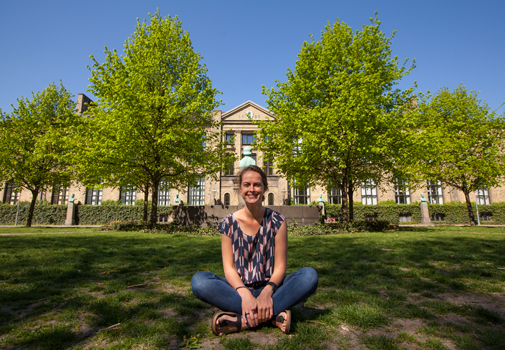
“I’m employed by the UN as a Junior Professional Officer (JPO) under the UN World Food Programme in South Sudan. We distribute food to the most vulnerable people in war and disaster areas.
Normally, this kind of help is given unconditionally, but I have been assigned to one of the more development-oriented food programmes. This means that we provide food, while the locals work to create assets, i.e. build roads and dykes, cultivate land, establish vegetable gardens etc. We hope that they will thereby be able to create their own future and become more resilient, particularly to war or climate change.
My role is to coordinate and report on our activities in seven of the ten South Sudan states we are active in. I’m responsible for liaising with our donors.
I also engage in dialogue with our partners when we launch new projects, and I monitor their activities to ensure that they meet our standards. For example, the locals have to construct a certain length of road in order to get help from us. I am involved in assessing whether these requirements are being met, and whether the locals are informed about how much food they are entitled to, and which technical and environmental standards the various roads and farms must comply with.
Pathway To The Job
Every year, the Danish Ministry of Foreign Affairs advertises a number of Junior Professional Officer positions with the UN. These target young people under 32 who are graduates and have some work experience, preferably from developing countries. I applied and was fortunate enough to get the job in the first round.
One of the reasons I got the job was my technical background from Forest and Nature Management in relation to nature management principles and factors that influence plant growth etc. The programme also provided me with the necessary organisational and strategic overview.
Another important factor was that I have travelled and worked in various countries. The first thing I did on my master’s programme was a six-month exchange in Australia. They have a strong focus down under on handling conflicts between local communities and external stakeholders who want to exploit natural resources.
I continued working with conflict management when I returned home, and ended up going to Tanzania, where I wrote my master’s thesis on conflicts between farmers and elephants. After graduating, I also went to Ghana on an internship with an international NGO.
A Typical Day Working For The UN
I work a lot in the office in the capital Juba, but I also venture into the field to monitor that our activities are running as they should.
A typical day at the office might involve meeting with our partners to discuss how to implement our activities, and what challenges they are facing. I might also hold meetings with our donors, to discuss certain goals we need to meet.
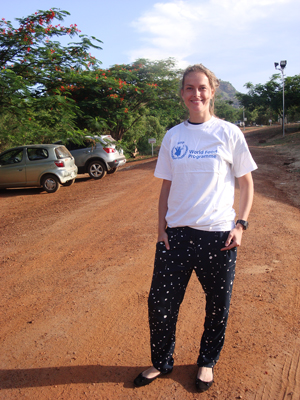
For example, we have announced the goal of involving more women in our activities. Women are very marginalised in South Sudan, and we want to involve them more in the decision-making processes.
Out in the field, I evaluate how the local farmers cultivate the soil. For example, it has been a traditional practice to burn large tracts of woodland in order to cultivate a small plot of land. In such cases, I use my technical knowledge of agriculture and cultivation methods to propose alternative, more sustainable solutions.
Challenges In My Work
There is still armed conflict in South Sudan, and this affects my work here. I’m not a target as such – but some of our local employees have to be careful which areas they operate in.
As a result of the political tensions in South Sudan, my colleagues and I live and work in a guarded compound that we never leave after 21:00. You also quickly learn not to discuss politics and tribal relationships. Because conditions are a little more difficult here than in other areas where the UN operates, my work is organised in such a way that I have to go home or to another country every six weeks to have a break.
When working in the field, I can’t speak to the locals, because they often only speak their own language. All communication is via our local employees, who come along and act as interpreters. I feel this is a challenge, because I would really like to understand the details of what the locals are saying. Some of the meaning is lost in translation.
My Passions
Working with a lot of other nationalities is very rewarding. It’s also really exciting to work in a political context that I’m forced to take into account as I go about my daily work. I constantly need to factor in issues like inflation, the conflict and the country’s attempt to establish a viable government.
I’m absolutely passionate about driving development together with the local population and about utilising the area’s natural resources in a sustainable way that benefits those who live there and reduces the environmental impact.
In the long term, I would like to work more in the field, solving the practical problems associated with utilising natural resources in disadvantaged areas. For example in Haiti, where severe deforestation has caused problems for people and the environment.
I don’t mind getting my hands dirty, in fact I’d like to, working with locals to ensure the best possible utilisation of the forests. To create a culture where people think about sustainability instead of felling trees indiscriminately, because this course can lead to major problems with erosion, waste accumulation and collapsing houses.
Away From The Classroom
I didn’t start studying Forest and Nature Management with a particular goal in mind. I took things one step at a time. It’s a good idea for some people to plan their career path, but I was driven by what I found academically stimulating, and where that interest could take me.
I know that students are under immense pressure today to complete their studies within the prescribed time, but I would still encourage others to take some chances and try out other study-related activities, e.g. by going on an exchange. This brings a lot more personal and professional growth than simply sitting in a classroom.”
We met with Camilla Buch Vang Hansen just after she completed her first year on the Forest and Nature Management programme.
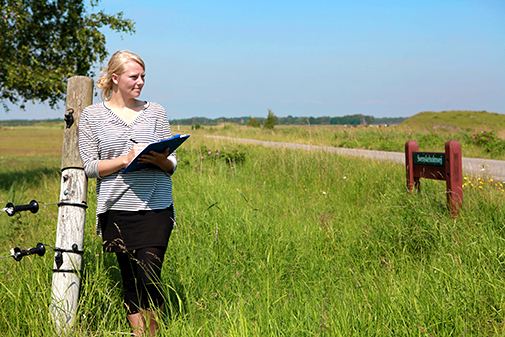
Why did you choose Forest and Nature Management?
I did my bachelor’s degree in Natural Resources, specialising in nature management. I wanted to continue along the nature management path, where you work with nature directly, as well as the relationship between nature and people.
I like the three pillars on which the degree programme rests: nature, the economy and humans in nature.
It is also about management. About learning to work as a project manager who is part of a team. It takes leadership, nature management and strategy to protect nature while also meeting human needs. The leadership aspect is what makes all the difference to me. The added dimension of having to deal with people and teams really appeals to me.
For me, the keywords are priorities and decisions. That is, asking the question: Why do we need to work with this? I really want to be involved in the political game and help make the decisions.
What kind of job would you like to do when you finish your studies?
I don’t know exactly which direction I want to take, but it will probably be as some kind of project manager. Preferably in the public sector, say in a government agency. But I don’t want to be a forester. I’m more interested in conflict resolution.
What was the transition from bachelor’s to master’s programme like?
It was like the transition from upper secondary school to university. It was the same experience of the field narrowing: you learn a lot, start focusing more on specialist subjects – and you end up doing only the specialist subjects that are exactly aligned with your interests. The master’s programme is more fine-tuned, more demanding and more fun.
Why did you choose the University of Copenhagen?
I also looked at what other universities were offering, but was quite sure that the University of Copenhagen was right for me. And I was right. Before starting my studies, I spent a day following a friendly MSc in Forestry student around the university, and I utterly loved it – the tranquillity, the mindset, the mentality. Nobody here feels it’s beneath them to wear wellies. I like that.
Have you had student jobs?
Before starting university, I worked for Post Danmark for two years, and I carried on doing that for a while alongside my studies. I currently have a student job as a coordinator for the university’s school services. I have also worked as a guide at the faculty. So I’ve been pretty lucky in finding student jobs.
What is the study environment like?
It’s really easy to have a social life at the university. It’s an environment where you can get to know a lot of people. I’m involved in a special interest group called Nature and Society, I’m active in student politics, and I’m a student representative on the scoping committee in my trade union.
If you want to, you can enjoy a rich social life at all levels. You can spend your whole life at the university without ever getting bored, because there are lots of fun people.
Is there a very competitive mindset?
No. It’s actually really relaxed. The university is like your second home.
Would you recommend the programme to others?
Forest and Nature Management is a highly future-oriented programme, and interdisciplinary. But you have to work out yourself what you like about the programme. Since I enjoy my studies so much, it’s difficult to find anything negative to say about the programme.
Studying and working at the same time is two things which go hand in hand for Jakob Svendsen-Tune, Denmark. He works as a forest assistent in a forestry company in Sweden – close to Copenhagen, Denmark – as part of his thesis work which is based on a real life case in the company.

“This programme has made me proficient in three interrelated scientific fields which are essential if you want to manage our natural resources: Ecology, economics and social studies”, Jacob says.
Additionally, the programme combines theory and practice bringing students in touch with real life all through their studies.
Creating An IT-system For A Company
Jakob is working on his thesis in collaboration with a class mate. They are developing an IT-system which can be used by forestry companies to make detailed planning of their business.
”The system will make it possible for forestry companies to keep track of their tree sale, make statistics and create detailed budgets. We make the system for a forestry company in Sweden which needed a tool to plan their activities better. We have analysed many different aspects of the company and their procedures and are developing a system which is tailor-made to suit the needs of the specific company”, Jacob says.
Different Nationalities And Backgrounds
According to Jakob, Frederiksberg campus in the middle of Copenhagen is the perfect setting for the development of a vibrant international study environment for all students at the Faculty. The campus creates a common identity among the students and the many social activities on campus provide students with the opportunity to network with students enrolled in many different study programmes and with many different nationalities and cultural backgrounds.
“The enthusiasm of the older generations of students at the Faculty is passed on to the freshmen which makes new students feel comfortable and part of a strong community from the very beginning of their studies”, Jacob says.
”We read a lot of books, not just because we are told to do so, but because what we are taught in class we can actually use after we graduate”. These are the words of Anne-Sophie Freltoft Knudsen. She is studying Forest and Nature Management on her second year.
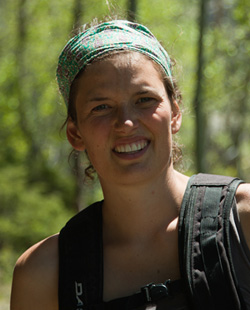
”Among other things, we saw how they had restored a raised bog that earlier had been completely forest-covered. It was very interesting.”
Different Aspects
Anne-Sophie also appreciates that the FNM studies combine social and natural sciences because it prepares her to consider every aspect of a problem.
”Often, several interests are at stake. Not using pesticides on the fields might be what is best for nature, but on the other hand the farmers need to make both ends meet. Therefore, we are trained to consider environmental visions and wishes and include what will be practically possible as well as the possibilities and limitations according to the legislation.”
These are qualifications that will be of very good use when Anne-Sophie in the spring 2012 is going to write her final thesis on outdoor policies and management at the estate, Gl. Kjøgegård. Together with her thesis group she will investigate how to obtain the best interaction between runners, dog walkers, mountain bikers, hunters, the land agent and other groups who use the beautiful nature that surrounds the estate.
”I look forward to immerse myself in the challenges that they experience at the estate and to work out suggestions as to how we secure the balance between protection and use. We might also prepare a proposal for an information campaign.”
Nature Protection In The US
In the spring of 2011, Anne-Sophie studied in Idaho, US for one semester. During this semester, she gained an insight into the American effort to change the behaviour of the citizens in terms of reduced consumption and increased recycling. She also dipped into wildlife and nature management in the national parks, where especially litter left by visitors is a major challenge.
In December 2011, Walid Mustapha went to South Africa to attend the UN Climate Change conference. Now he plans to target his final year courses to strengthen his abilities within climate politics and negotiations.
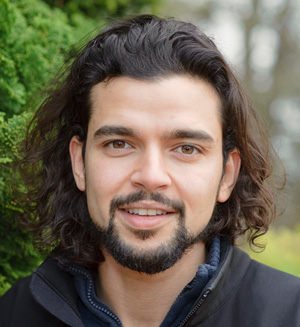
The delegation included eight other Forest and Nature Management students from Norway, Germany, Finland, Indonesia and Nigeria, among other countries. Every morning in Durban, they coordinated which negotiations, lectures and other events they each would participate in that day, and every evening they met again to exchange new knowledge and experiences.
Before leaving, Walid had the following comments on his expectations to the trip:
”I really look forward to soaking up information and learning how large international climate negotiations take place. People from all over the world with knowledge and interest in climate and the environment will be gathered in Durban, so we will have a unique opportunity to strengthen our global network and showcase forestry students to international collaborators and future employers.”
During the negotiations, Walid and his delegation met with research institutions, such as CIFOR (Center for International Forestry Research) and IUFRO (the International Union of Forest Research Organizations), as well as environmental organizations like Greenpeace and Forests of the World. They also facilitated contacts between IFSA students and companies looking for trainees.
And even if the political result of the negotiations was unambitious, according to Walid, he describes the trip as a fantastic experience that has helped him decide how he is going to compile the last part of his studies.
”This has inspired me even more to work within climate politics and negotiations. Preferably I would like to be a mediator between natural science and sociology. I believe that if we really want to put our knowledge about ecological systems, forest preservations and CO2 mitigation to use, we need to include and involve the local populations around the world to a much greater extent, and also secure their rights. I would really like to play a part in getting that job done,” says Walid, who graduated with a bachelor degree in environmental planning and social science from the University of Roskilde prior to studying Forest and Nature Management at University of Copenhagen.
About IFSA
The International Forestry Students’ Association (IFSA) is a global network of forestry students from more than 50 countries. Read more: www.IFSA.net
